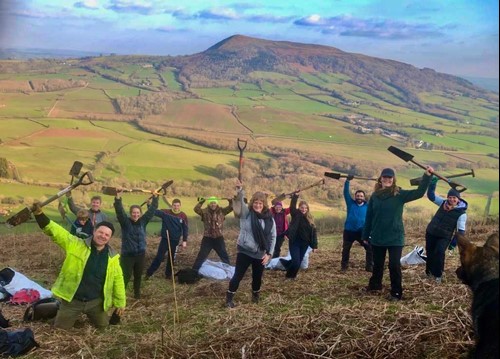Climate change

Climate change can be described as a change in global or regional climate patterns. These changes have become particularly apparent during the period covering the last third of the 20th century to the present, and they are largely due to human activity. Humans have been burning coal, oil and gas (fossil fuels) since the Industrial Revolution and the planet’s carbon dioxide levels have been steadily rising over the same period.
According to many experts, we are on track for a temperature increase of between 3°C and 4°C by 2100. This may not seem like a massive rise over the next 80 years; to some it might even seem like a pleasant change, an improvement on the normally mild Welsh weather, perhaps. However, this projected change in temperatures actually has disastrous effects on the planet and its residents. But you probably know all this.
Climate change is quickly becoming intertwined in all elements of society. It is a topic that is beginning to crop up in small council meetings in town halls, in conversations over coffee between a barista and a customer, and in international summits amongst leaders of the world’s largest countries. Its relevance across society today means that the term ‘climate change’ carries more weight in businesses, charities and amongst friendship groups – amongst us all. Conversation about what to do about it now abound.
One method of tackling climate change is by using nature-based solutions. Nature-based solutions are great alternatives to geoengineered or technological approaches to climate change. Geoengineered solutions will undoubtedly be important in the future. For now, though, they are largely theoretical and untested at scale in the real world. Technological solutions such as solar and wind may be effective in creating sustainable energy, but they cannot enhance an area’s biodiversity levels or ecosystem in the same way that nature-based solutiuons can. Planting trees, one of the key nature-based solutions, is arguably the most environmentally friendly way in which climate change can be tackled by us. If done well, it is a long-term and beneficial route to reducing the levels of carbon dioxide in the atmosphere, which in turn, will mitigate the planet’s rising temperatures.

Trees naturally capture carbon from the atmosphere through the process of photosynthesis, and they are then able to store it up for centuries. The entire tree is responsible for absorbing the carbon – including the wood, roots, leaves and even the surrounding soils. Just one hectare of trees can store upward of 400 tonnes of carbon. Trees don’t just absorb carbon, though: they also fight other smaller struggles in the contest to mitigate climate change. Trees can act as natural flood defences, improve soil quality, reduce temperatures in built up areas and even reduce pollution.
Even though planting trees is particularly convenient way of combating climate change, there are not nearly enough afforestation initiatives in the UK. To the sort of significant affect that is now required, we need to plant a very large number of trees. In the UK only 13% of land area is covered by trees; according to the International Panel on Climate Change, this needs to be increased to at least 19% to help reach the target of being carbon net zero by 2050. Although a 6% increase in tree cover in the UK sounds like a lot, digital mapping indicates that this is within our scope.
Globally, there are strong links between climate change and deforestation. Not only does deforestation decrease the number of trees absorbing carbon from the atmosphere, but the process itself is very damaging to entire ecosystems. When trees are felled, many are left to rot or are burnt: either way, the carbon the trees sequestered while they were alive is eventually released back into the atmosphere. Deforestation alone accounts for 10% of worldwide emissions.
How to get involved!
There are so many ways to learn about climate change and related environmental issues. You can read, watch, listen, or discuss the issues online – and most of it is free! Social media platforms are a good way to learn and share interesting and insightful information. Beware though, not everything you read is 100% accurate. Here are some people to follow that promote climate change awareness on Instagram:
All of the above share insightful stories, links to interesting articles and other useful information regarding climate change. Give them a follow.
On BBC iPlayer, under ‘Science and Nature’ there is a range of various factual and inspiring programmes that discuss climate change and its various knock-on effects, such as biodiversity loss. This includes ‘I Am Greta’, ‘Extinction: the Facts’, and ‘Generation Activism’, which are all available now for free.
It’s easy to feel a little bit helpless when faced with a gigantic issue like climate change, but small daily changes DO make a difference. You might want to start cycling, instead of getting into the car for short journeys; you can give up meat one meal, or even one day a week; you could plant a tree. The key is to talk about the changes you’re making with family, friends and colleagues. If you tell your aunt you’ve started cycling, she might then tell her work colleagues, so they might start cycling more often, and so on. This is how community action works. These small conversations have knock-on effects which accumulate to make a difference. Even planting a tree in your garden, your local community woodland or perhaps with Stump Up For Trees makes a difference. Imagine if everyone in Wales did this, every year for the next few decades. The key is we do it together..
Thanks for reading,
Ellie Lebbon
— Ellie is going to study an Msc in Climate Change and Environmental Policy at Leeds University in 2021. She has generously been volunteering her time, helping Stump Up For Trees with social media content and strategy. Thanks, Ellie!